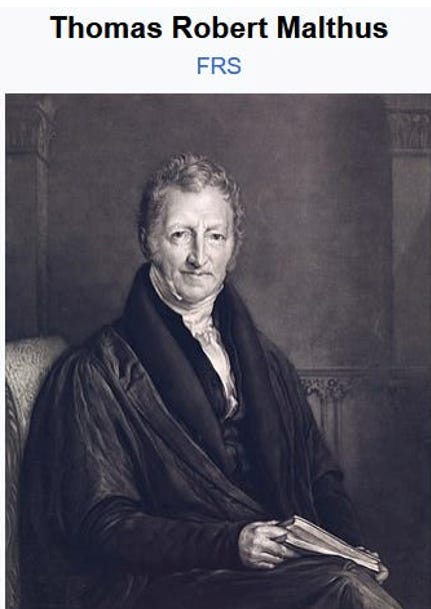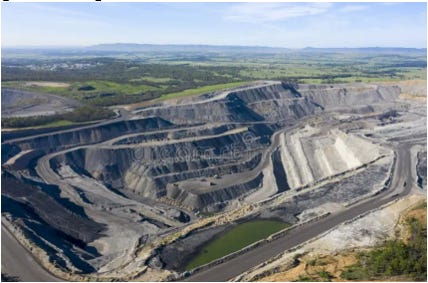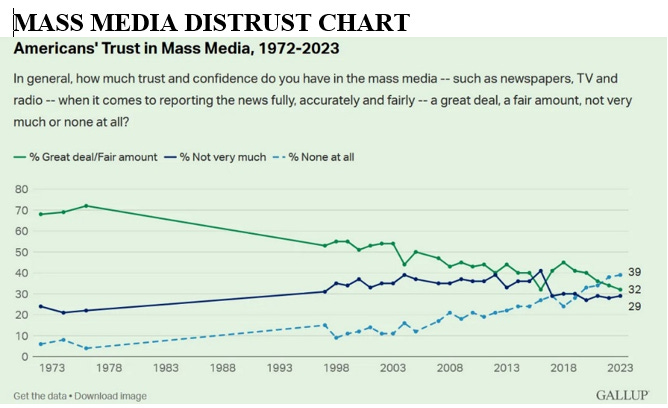Tesla Shares Plunge – Malthus was a Lousy Economist – Fossil Fuels An Ancient (False) Narrative – Methane on the Moon Titus – The Persistence of Incorrect Theories - [01-28-24]
Direct from BOOM Finance and Economics at the links below
Hat Tip to my colleague at BOOM Fin4ance and Economics Substack (Subscribe for Free) - also on LinkedIn and WordPress. Covid Medical News Network CMN News BOOM Blog and All Editorials (over 5 years) at BOOM Finance and Economics | Designed for Critical Thinkers — UPDATED WEEKLY (WordPress.com)
BOOM Finance and Economics seeks out the very best information from authoritative sources and strives for consistency in its quality and trustworthiness. Over 5 years, BOOM has developed a loyal readership which includes many of the world’s most senior economists, central bankers, their senior advisers, fund managers, and academics. If you want a real edge in understanding the complex world of finance and economics, subscribe to BOOM on Substack or as a Follower on LinkedIn.
BOOM EDITORIAL THIS WEEK
TESLA IS POUNDED – SHARES DROP PRECIPITOUSLY. BOOM has been following the shares of Tesla closely over the last few months, as regular readers will know.
In last week’s editorial, BOOM wrote, “Tesla shares have been in downtrend for the last two years and that downtrend now seems recently confirmed. There is some buyer support around $190. However, if that level is broken, then stronger falls may be coming.”
That level of support around $190 was broken in Thursday’s trading session with Tesla down 12% at the close. For the week, it was down almost 14%. This is a large fall. Investors are becoming fearful about Elon Musk’s shareholding, the impact of Twitter’s poor revenues and the reduced revenues of Tesla. Investors have not forgotten that Musk and his fellow wunderkind, Jeff Bezos, sold $20bn of Tesla shares in 2022. Musk sold those shares to help him buy Twitter. It has been reported that CEO’s and insiders sold $69bn taking the chance to sell at very high prices.
One senior financial newspaper stated during the week that, “he has implicitly threatened to leave the electric vehicle company unless he is granted tens of billions in shares”. BOOM cannot verify that statement and thus is unwilling to attribute its source. However, it is exactly what BOOM has been expecting. Twitter may actually kill Tesla if the whole scenario falls apart from falling revenues and lack of profit. Musk has got away with a great deal over the years by using ‘Blue Sky’ as his chief promise to investors. However, eventually the piper has to be paid. BOOM wishes Musk no harm. However, reality is a harsh judge and blue skies are often replaced by storm clouds.
The financial media is currently awash in critical articles of both Tesla and Musk. If Tesla shares continue to fall towards the $100 price level, it could all implode for the investors who may have bought shares during the last three years. Many would have paid over $200 for their shares. $180 is certainly a moment of truth for them. Mr Musk depends upon a loyal troop of enthusiasts but in financial markets such loyalty can evaporate rapidly.
Friday’s market action was not encouraging with the shares trading in a tight band and ending the week at $183.25. BOOM suggests that readers go back and read the BOOM editorial dated 12th November 2023: 'TESLA IN THE BALANCE' - THE FUTURE OF ELECTRIC CARS?
BOOM Quote: “The modern electric car industry is now (again) plagued by significant uncertainties. Here is just a few that spring to mind — insufficient recharging stations, range anxiety, increasing insurance costs, uncertain battery life, battery replacement costs, battery weight, increased tyre wear, high initial purchase prices, uncertain resale prices, inadequate model choice, mineral consumption, electromagnetic field radiation from the batteries (EMF) and its long term health consequences and, last but not least, the base energy source used to provide the electricity to charge the batteries (e.g. coal, gas, oil, nuclear, solar, wind etc).”
THOMAS MALTHUS WAS WRONG AND MALTHUSIANISM IS A FALSE RELIGION – A 200-YEAR-OLD NARRATIVE. Why do people still pay so much attention to a man who was completely wrong in his economic hypothesis and who died almost 200 years ago? That is a mystery to BOOM. It seems that human beings have a natural preference for fearful narratives of DOOM and GLOOM over alternatives that portray a bright future for humankind.
BOOM often thinks of this comment from John Maynard Keynes, made in 1936. It is still relevant today. It applies to Thomas Malthus and his theory of overpopulation.
“Practical men who believe themselves to be quite exempt from any intellectual influence, are usually the slaves of some defunct economist.”
Thomas Malthus was born in 1766 and died in 1834. He was an English economist who wrote a book in 1798 (when he was only 32 years old) that has captured the imaginations of millions (or perhaps billions of people) ever since.
The book was called “An Essay on the Principle of Population”. Malthus was worried about population growth and the (presumed) inability of the agricultural sector to feed the increased population. Thus, he predicted an overpopulation catastrophe.
Even today, many people are still infected with this strange mind virus. The so-called “World Economic Forum” in Davos appears captured by it, which is no surprise because the intellectual firepower on display there each year is sub-standard, to say the least. A version of it involves the conviction that we will (somehow) run out of energy and, thus, be unable to feed the eight billion people who now live on Planet Earth.
Malthus accurately observed that an increase in a nation’s food production would inevitably lead to population growth. However, he then made the false assumption that population growth would eventually outpace the growth of food production, leading to famine, warfare and disease.
He could not see the importance of innovation. He could not see that new forms of energy would be found. He could not see that further innovation would lead to rapid improvements in the use of energy. He could not see that the number of farm labourers would collapse as innovative machines increased the productivity of each farm worker. He completely missed the contribution that would come from the world of mechanical engineering and energy discovery.
BOOM often reminds readers: “False Assumptions lead to False Conclusions” aka, logical fallacies
In other words, Malthus was a lousy economist. But, somehow, his ideas have continued to fascinate. Malthusian dreams are hard to kill and, by the way, he is not alone. Lousy economists are still the norm. They are the court jesters of modern life. And they still have a great deal of influence, especially if they promote DOOM and GLOOM narratives.
When considering this phenomenon of Malthusianism recently, BOOM made a swift calculation within five minutes that completely destroyed all Malthusian dreams that still exist today in the minds of many people, including many so-called economists. Here is the calculation (which took just five minutes and not 200 years).
8 Billion people on Earth
8,000 Million = 800 Cities of 10 Million
London (10 Million) is 1,600 Square Kilometres in size
1,600 x 800 = 1.28 Million Square Kilometres
The state of Alaska is 1.7 Million Square Kilometres
Thus, the entire World Population of eight billion can be housed within the boundary of Alaska at the same density as London. No need for Hong Kong skyscrapers. No need for the density of Tokyo.
We do NOT have a Global Overpopulation problem! Can we please put Thomas Malthus to bed once and for all? If the entire world lived in Alaska with the accommodation and infrastructure completed, the abundant resources of the rest of the world could be used to support them with a relatively small workforce. The planet could easily support this and the energy requirements of eight billion people would be easily met by the energy resources available on the planet.
There is no need to dream of mass starvation. Forget the Georgia Guidestones that predicted only 500 million people on the planet. Forget Klaus Schwab and his unelected band of intellectually challenged misfits. We can feed eight billion and we do. Now we need to raise their standard of living to acceptable levels so that we can all live in dignity and peace.
FOSSIL FUELS – ANOTHER ANCIENT FALSE NARRATIVE. The theory that fossil fuels formed from the fossilised remains of dead plants by exposure to heat and pressure in the Earth’s crust over millions of years were first hypothesised by the German academic, Andreas Libavius, in his book Alchemia (or Alchymia), published in 1597. Yes, this myth is 400 years old! It even predates Malthus.
Libavius was born in 1550 and died in 1616. He was not a geologist, a chemist or a physicist. He was a professor of history and poetry. He appears to have been some sort of doctor of medicine as well, although that may have been an honorary title. However, he dabbled in lots of subjects including “alchemy” and he did write Alchemia, one of the first chemistry textbooks ever written.
Libavius was also a staunch believer in “chrysopoeia” which was the ability to transmute a base metal into gold. He also accepted occult explanations to explain phenomena with no apparent cause. Libavius had a vivid imagination and was a busy man. He wrote more than 40 books over 25 years in the fields of logic, theology, physics, medicine, chemistry, pharmacy, and poetry. It would appear that his ideas of “fossil fuels” were just another crazy idea he had.
The next record of anything resembling “fossil fuels” was made by a Russian polymath, Mikhail Lomonosov, born in 1711 – died in 1765. He was a scientist and writer, who made important contributions to literature, education, and science. Among his discoveries were the atmosphere of Venus and the law of conservation of mass in chemical reactions.
His spheres of science were natural science, chemistry, physics, mineralogy, history, art, languages, optical devices and others. Another vivid imagination. He is regarded as the founder of modern geology but he was also a poet and influenced the formation of the modern Russian literary language. Lomonosov was also a busy man and scarcely had the time or the ability to seriously consider the origins of Hydrocarbons. He did write a seminal book on geology called “On the Strata of the Earth” but most of it was probably conjecture as little was known at the time about what lay beneath the Earth’s surface.
But the first attributed use of the term “fossil fuel” occurs in the work of the German chemist Caspar Neumann, in an English translation of 1759. Neumann was a Professor of Chemistry in Berlin. Neumann was essentially a pharmacist. Here is the explanation for the theory of “fossil fuels” as per Wikipedia – no doubt is expressed.
“Aquatic phytoplankton and zooplankton that died and sedimented in large quantities under anoxic conditions millions of years ago began forming petroleum and natural gas as a result of anaerobic decomposition. Over geological time this organic matter, mixed with mud, became buried under further heavy layers of inorganic sediment. The resulting high temperature and pressure caused the organic matter to chemically alter, first into a waxy material known as kerogen, which is found in oil shales, and then with more heat into liquid and gaseous hydrocarbons in a process known as catagenesis. Despite these heat-driven transformations, the energy released in combustion is still photosynthetic in origin.”
“The result is that a complex mixture of organic compounds reside in sedimentary rocks, serving as the precursor for the formation of hydrocarbons such as oil and gas (and coal). In short, kerogen amounts to fossilized organic matter that has been buried and subjected to high temperatures and pressures over millions of years, resulting in various chemical reactions and transformations.”
This theory is accepted by just about everyone except the Russian geologists who challenge it. Hydrocarbons are the resultant fuels – oil, gas (including Methane) and coal. Coal deposits are often remarkably shallow and can be mined using open-cut methods.
BUT THERE’S A PROBLEM WITH TITAN which challenges the ‘fossil’ origin myth. An ocean of Methane and Ethane exists on one of Saturn’s Moons!
Lakes of liquid ethane and methane exist on the surface of Titan, Saturn’s largest moon. This was confirmed by the Cassini–Huygens space probe. Cassini was the fourth space probe to visit Saturn and the first to enter its orbit, where it stayed from 2004 to 2017. However, the presence of methane on Titan was suspected way back in 1980. So we have known about this for almost 45 years! [AP Note, I will be discussing the persistence of propaganda this Saturday explaining this phenomenon]
“The possibility that there are seas on Titan was first suggested based on data from the Voyager 1 and 2 space probes, which flew past Titan in 1980. The data showed Titan to have a thick atmosphere of approximately the correct temperature and composition to support liquid hydrocarbons. Direct evidence was obtained in 1995 when data from the Hubble Space Telescope and other observations suggested the existence of liquid methane on Titan, either in disconnected pockets or on the scale of satellite-wide oceans, similar to water on Earth”
THE PERSISTENCE OF INCORRECT THEORIES – ask, “WHAT IS THE TARGET TEMPERATURE?” In a few short paragraphs, BOOM has just destroyed two of the most precious (and ancient) theories of modern times, the concept of Malthusian overpopulation and the concept of so-called “fossil fuels” sourced from ancient forests, plankton and dinosaurs.
The other modern absolute hypothesis which has ascended to what resembles a religion of sorts is, of course, the concept of so-called “Climate Change”. Supporters of this regard any challenge to the theory as blasphemy. They even seek to stop all debate by saying, “The science is settled”. Unfortunately, they do not seem to understand that a theory is not “science”. Proof of a theory is what science is all about. That is an important distinction.
Professor Willie Soon, a famous Astrophysicist, has challenged this theory for a long time. He understands all the dynamics of Earth’s climate which he says is mostly determined by that large radiant ball in the sky which we call The Sun. Perhaps volcanic activity and cosmic rays of Protons are also involved? However, he was recently interviewed by Tucker Carlson when he said something that revealed great clarity of thought.
“What is the target temperature of the Earth that these “climate change” fanatics are seeking to achieve? Do they have the same target temperature in mind for the Sahara desert as they do for Siberia?”
LOSS OF TRUST IN MAINSTREAM MEDIA. On 10th December, BOOM wrote an editorial about LOSS OF TRUST IN THE MAINSTREAM MEDIA.
Last week in Los Angeles, the LA Times laid off 120 employees, around 20% of its newsroom. BuzzFeed, which has lost over 97% of its value since going public in 2021 is trying to sell assets. In 2014, ten years ago, a Pew Research Centre survey found that in the United States, BuzzFeed was viewed as an unreliable source by the majority of respondents, regardless of age or political affiliation. The company’s audience has been described as “left-leaning”. That means “woke”.There are reports of 30,000 employees having been laid off by American media companies last year. BOOM wrote on 10th December 2023:
“A recent Gallup Poll in the United States dealt with this matter. Gallup reported, on 19th October, that a record number of Americans (39%) now have “no confidence at all” in their mainstream media. Another 29% of U.S. adults have “not very much” trust.
Think about that – almost 70 % of Americans have either no trust at all or not very much trust in their mainstream media.” Here is the chart from a Gallop Poll showing what happened.
BOOM’s QUANTITATIVE BOOSTING FOR THE PEOPLES MONEY EXPLAINED: https://boomfinanceandeconomics.wordpress.com/2019/12/15/boom-as-at-15th-december-2019/ AND BOOM’s Perfect Economy: https://boomfinanceandeconomics.wordpress.com/2020/01/18/boom-as-at-19th-january-2020/
COMING NEXT:
Financial Jigsaw Part 2 - Chapter 3 - ‘Propaganda’ – Saturday, February 3, 2024
BOOM Global Review – Tuesday, February 6, 2024
Letter from Great Britain – Broken Britain – Saturday, February 13, 2024
In economics, things work until they don’t. Make your conclusions, and do your research. BOOM does not offer investment advice.
CLICK HERE FOR PODCASTS: OUR BRAVE NEW ECONOMIC WORLD
BANKS DON’T TAKE DEPOSITS, THEY BORROW YOUR MONEY: LOANS CREATE DEPOSITS — that is how almost all new money is created in the economy (by commercial banks making loans). https://www.bankofengland.co.uk/quarterly-bulletin/2014/q1/money-creation-in-the-modern-economy. Watch this short 15-minute video and see how Professor Richard Werner brilliantly explains how global banking systems really work.
In 2014, Richard Werner provided the first empirical evidence that banks create credit out of thin air. They do this whenever they issue a loan or, more specifically, purchase a promissory note. This is a walk-through of exactly how they do it.
Most economists are unaware of this and even ignore the banking & finance sectors in their econometric models.
DISCLAIMER: All content is presented for educational and/or entertainment purposes only. Under no circumstances should it be mistaken for professional investment advice, nor is it at all intended to be taken as such. The commentary and other contents simply reflect the opinion of the authors alone on the current and future status of the markets and various economies. It is subject to error and change without notice. The presence of a link to a website does not indicate approval or endorsement of that web site or any services, products, or opinions that may be offered by them.
Neither the information nor any opinion expressed constitutes a solicitation to buy or sell any neither securities nor investments. Do NOT ever purchase any security or investment without doing your own and sufficient research. Neither BOOM Finance and Economics.com nor any of its principals or contributors are under any obligation to update or keep current the information contained herein. The principals and related parties may at times have positions in the securities or investments referred to and may make purchases or sales of these securities and investments while this site is live. The analysis contained is based on both technical and fundamental research.
Although the information contained is derived from sources that are believed to be reliable, they cannot be guaranteed.
Disclosure: We accept no advertising or compensation, and have no material connection to any products, brands, topics or companies mentioned anywhere on the site.
Fair Use Notice: This site contains copyrighted material the use of which has not always been specifically authorized by the copyright owner. We are making such material available in our efforts to advance understanding of issues of economic and social significance. We believe this constitutes a ‘fair use’ of any such copyrighted material as provided for in section 107 of the US Copyright Law. In accordance with Title 17 U.S.C. Section 107, the material on this site is distributed without profit. If you wish to use copyrighted material from this site for purposes of your own that go beyond ‘fair use’, you must obtain permission from the copyright owner.










I made this comment in response to BOOM's post:
I want to respond to a claim you made in your most recent post. You posit, "Thus, the entire World Population of 8 Billion can be housed in Alaska at the same density of London." That statement is not entirely correct. It must be kept in mind that the size of land occupied by city dwellers is much larger than their respective share of the city. Food, clothing, goods, and resources consumed by people are produced using land away from where they live, scattered all around the world. People are connected to such land by energy, or fuel, that allows stuff to be transported to their proximity in the city. Thus, the issue of population size is not a question of available land, but, primarily, of energy available at EROI at a level that allows the just-in-time system to function. Whatever the world population crammed into Alaska would produce would have to be able to pay for the energy needed to feed and clothe them, which is hardly possible.
That brings us to– for lack of a better word - fossil fuels, the other issue you mention. What matters is not their origin but whether they're finite and if not, at what rate they replenish. It's been the discovery of coal, oil, and gas and the subsequent development of industrial technologies that have permitted humankind to improve their living standard tremendously during the past few centuries, including an unprecedented increase in population size. If the conventional theory is correct, and fossil fuels are finite, there is no question that the world's population housed in Alaska would be dead within a matter of weeks. If the abiotic theory is correct, and fossil fuels are replenished, the question is at what rate. For extraction would have to be at a maximum at that rate for the use of fossils to be sustainable. As far as I've been able to find, the abiotic theory appears to be wishful thinking; I'm not aware of any hard data on the replenishment rate, if that's how it works.
There are various other issues, such as that fossil fuels are also the source of fertilizer and other materials, and the fact that the growing human population is crowding out other biological species, which disrupts its natural habitat, but energy is the key issue.
As far as innovation and the allusion that humans will be able to solve the predicament of dwindling fossil fuels by substituting them with another source of energy, there is nothing in sight at the moment that would allow the world to go on as is if fossil fuels are no longer available or EROI goes up. Renewables, nuclear, hydrogen either do not provide the necessary energy density or are simply not feasible due to fact that include the virtual impossibility to mine and process enough materials for electric applications, even if energy could be captured in theory. A sufficient buffer for wind/solar applications is another problem. Excellent work on this subject, including detailed calculations, has been done by Simon Michaux (https://www.simonmichaux.com/). Will humans be able to find a solution? Maybe yes, maybe no. With the current knowledge, the only possible course is to slow down and downsize. Assuming that the industrial civilization will go on forever is fallacious.
Incidentally, the climate change, global warming/boiling, all sorts of green deals, and all the other stuff are pure bullshit. There might be some truth in these claims, but they reflect the utter inability of the so-called elites to understand and tackle the issues in question.
Anyway, it would be most judicious on humankind's part to consider the end of the industrial civilization a real possibility, and work toward a sustainable and as prosperous as possible existence in the post-industrial era, when the kind of manufacturing we have now is no longer available. For starters, people should preserve knowledge gained thus far by printing durable books, as opposed to converting everything into digital form. Likewise, technologies should be devised that would allow making things with minimum energy. Ditto agriculture.
Reportedly, what can be observed in the behavior of the human population in the past few hundred years is a standard biological phenomenon that occurs in nature. When a species discovers an abundant source of sustenance – in our case fossil fuels – it overconsumes the stuff and goes into a population overshoot. The more of them there are, the faster the resource is consumed and eventually the species starves to death and destroys its habitat in the process. If you take a sober look at the human civilization, that's pretty much exactly what's happening.